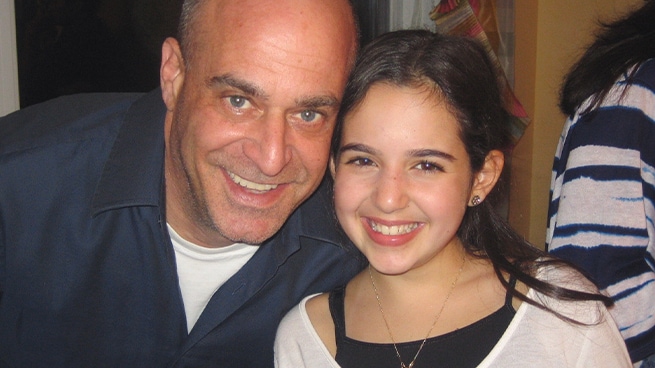{{item.title}}
{{item.text}}

{{item.text}}
Emmy Zemel, Manager, Consulting, PwC Canada
“Building a deep relationship with my father shaped my life and taught me the importance of investing in mental health just as we do in our physical health. Today, there are countless ways to seek help and connect with others, reminding us that support is always within reach.”
Content warning: This story includes references to mental health disorders and a mention of suicide. If you or someone you know is thinking about suicide or experiencing distress, text or call Canada’s Suicide Crisis Hotline at 9-8-8.
Taking care of my mental health has always been important to me. I grew up in a family that put a lot of emphasis on open communication, support and love when it came to mental health and mental illness. My dad lived with bipolar disorder, and my parents educated my sister and me about my dad’s illness throughout our childhood.
It formed the basis of a very deep relationship with him and shaped my life experience, teaching me the value of investing in your mental health just as we do in our physical health. But even though the topic of mental health was destigmatized within our family, it wasn’t outside of the walls of our home. When I was 15, I lost my father to suicide. This devastating and heartbreaking reality impacted me in many ways, and my grief included the extra challenge of stigma around mental health.
This catapulted me to where I am today—an advocate for mental health care and the destigmatization of mental illness, helping people seek the help they need and making sure no one feels defined by what they go through. I had an amazing relationship with my dad, who was one of the most vibrant, loving and generous people I’ve ever known, and I hated the idea of his memory being tainted by misconceptions and misunderstanding.
Towards the end of my time in high school, my mom and I started an initiative with the Jewish General Hospital in Montreal, creating an educational program with psychiatrists who visited high schools across the city. The goal was to raise awareness about mental health with young adolescents, and the initiative ran for three years. Since joining PwC Canada, I’ve been involved with our internal Disability Awareness and Wellbeing Network. I’ve loved having the opportunity to help facilitate these types of conversations in the workplace.
Despite going through something extremely difficult, I’ve been privileged to be able to access resources, space and support from loved ones to do what I need to do to heal.
Personally, I’ve found therapy to be a wonderful tool in my healing journey. I use it to work through my grief, as well as get to know more about myself and how the mind works. Ultimately, I want others to know mental health support is there if you need it, and you are not alone. In today’s world, there are many ways you can seek help or connect with others.
The more I share my dad’s story, the more I hear others. So, I continue to share in the hope that it benefits others. If I can help just one person, that’s all I could really ask for.
Emmy is a manager in our Consulting practice. She’s also an executive member of PwC Canada’s Disability Awareness and Wellbeing Network.
{{item.text}}

{{item.text}}

